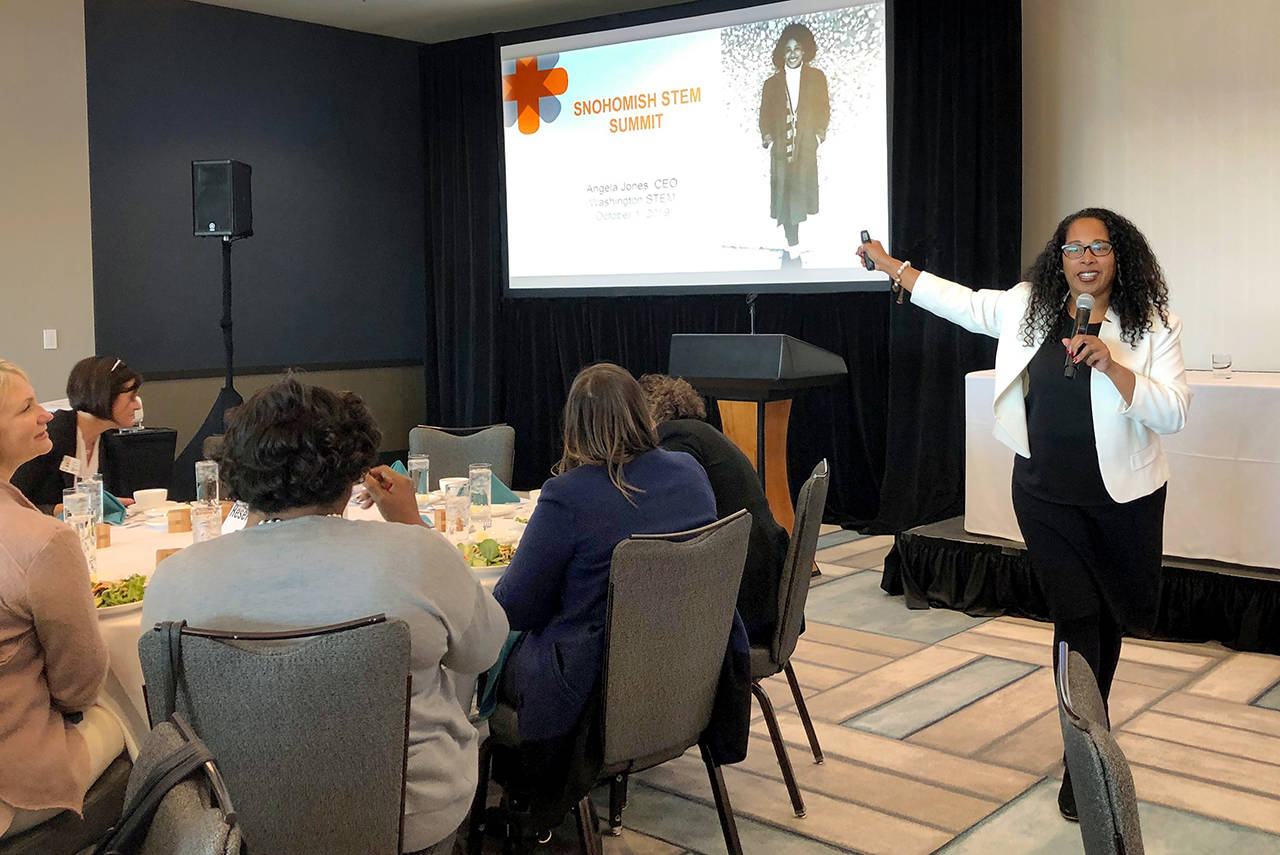EVERETT — Engineers, professors and college presidents are a mobile bunch. Offer them a decent job package and they’ll relocate, cross-state or cross-country.
That’s not always true for hourly workers and technical workers — the people who fix airplanes, assemble electronics or finish aerospace parts. “They do not relocate,” said Ben Hempstead, chief of staff at Electroimpact, a Mukilteo-based aerospace firm.
Therefore, “you have to grow them locally,” Hempstead told more than 200 educators and business and civic leaders at a science, technology, engineering and math (STEM) summit last week in Everett.
That’s becoming a thorny issue for Snohomish County.
The region’s major employers — aerospace and manufacturing companies — depend heavily on skilled workers.
According to keynote speaker Angela Jones, CEO of Washington STEM, by 2030 two-thirds of the region’s jobs will require STEM skills.
Yet “only 40% of students are on that track,” Jones said.
The U.S. Department of Education estimates that about 40 percent of students entering 10th grade go on to earn either a two-year or four-year post-secondary degree.
The percentage drops to 20% among students of color and students in rural areas, Jones said.
Building the county’s future workforce was the theme of the summit, which was sponsored by Economic Alliance Snohomish County and Workforce Snohomish. The event was held at the new Hotel Indigo at the Port of Everett.
The gap not only effects local companies and hiring, it reduces the earning power of local workers.
“STEM jobs pay nearly twice the amount of non-STEM jobs,” Jones said.
At the start of the event, Hempstead joined Dana Riley Black, assistant superintendent of Everett Public Schools, and Dayna Eden, chief people officerat Aviation Technical Services, in a panel discussion.
Kids need to acquire the skills to fill local jobs if they want to stay local, Hempstead said, and that process should start at “about third grade.”
Daria J. Willis, the new president of Everett Community College, agreed.
“By the time they get to high school it’s a bit late,” said Willis, who noted that she relocated this summer from Syracuse, New York.
“College presidents — they’ll move cross-country for a job,” she said.
Hempstead recommended companies consider supporting robot clubs. “It’s inexpensive.” Firms can buy and donate a robot kit for about $250.
Aviation Technical Services, an Everett aerospace company based at Paine Field, is trying a new grow-your-own tack. The firm recently launched an on-the-job apprenticeship for employees who want to become aviation mechanics. The phased program takes about 18 months, said Eden, the company’s chief people officer.
“It’s been a successful program — we don’t have it quite right just yet,” she told the audience.
Why is it so difficult to coax skilled workers to relocate?
“What are the obstacles? Is it a plane ticket? Is it housing for three months?” Dan Eernissee, the city of Everett’s economic development director, asked panelists.
Aviation Technical Services has offered those perks, but there are few takers, Eden said.
“We have tried the temporary housing route,” Eden said. “When potential job candidates look at the area’s relatively high cost of living — even though it’s less than Seattle — it doesn’t match their paycheck,” she said.
Growing your own skilled workers is the better option, she said.
Janice Podsada; jpodsada@heraldnet.com; 425-339-3097; Twitter: JanicePods
Talk to us
> Give us your news tips.
> Send us a letter to the editor.
> More Herald contact information.

























